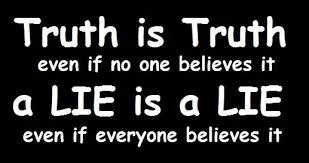Scene 1: I climb onto my soapbox:
I keep hearing that we live in a post-truth world.
This belief implies some disturbing assumptions.
1) Perception is truth…if I perceive it to be true, it must be true. If I want it to be true, it must be true. If it’s convenient for me to think it’s true, it must be true. ETC…
2) People are just too busy to check every fact, and any on-line source is questionable and biased…except for the sources that affirm my own opinion (see # 1).
3) People believe they have no power to change the world so accept whatever happens and roll with it…who cares if it’s true?
4) Serious fact-checking is no fun, and (see #3).
5) Lies make better advertising…if I promise you what you want, you’ll LIKE me and probably forget whether or not I deliver on the promise…and if you check back, I’ll just deny ever having promised you anything…even though you have it on video…big deal, and (see #1).
6) Everybody lies all the time…it’s just what we do...it’s the price of doing business…it’s the best way to get what you want and avoid negative consequences in the immediate future.
The assumptions go on and on…as S.E. Hinton said in The Outsiders, “I lie to myself all the time. But I never believe me.”
So what?
This is a quick post to give those who do performance audits and write performance audit reports a big slap on the back. You people seem to be among the last ones on earth interested in “the truth.” So keep up the good work.
Please resist any forces that ask you to bend the truth…after all, the END always justifies the MEANS.
Please resist any forces that ask you to weaponize your audits…a legislative committee that wants to use you to go after a political enemy (yes, I’ve seen such reports).
Stay true to your criteria. Report condition accurately. Give the whole story as best you can. I hate hearing “a piece of the truth” only to discover, once I know the real context, that the slice of truth outside its context is really just another lie.
Be real when you explain the effects of situations where conditions don’t meet criteria. Don’t soft sell; don’t overplay what’s there.
Get to the root causes as best you can…acknowledge that most “causes” are, at best, contributing factors in a complex “emergence” that involves several systems working synergistically to create what’s happening…or not happening. (See: https://en.wikipedia.org/wiki/Emergence)
Make recommendations that fit the cause and the real world.
In a world of truth-deniers, auditors are most like physicians. Auditors judge the relative health of programs/performance, etc., by comparing bona fide criteria to a real assessment of conditions. If there’s a gap, they see if the gap amounts to a real problem. If it’s a problem, they diagnose the cause. If they know the cause, they prescribe/recommend a cure.
THE TRUTH, writ large, is impossible to know. (“In today's postmodern world truth is increasingly difficult to define and defend,” said a current philosopher.) But writ-small it’s much easier to know whether specific statements of fact are true or false. Thank you auditors for making the effort.
SCENE 2: I leap off my soapbox, but carry it in my hand:
This is a blog on workplace writing. This post, more specifically, is about audit-report writing. Let it remain a harbor for the truth, writ-small. Every little hope we build toward being truthful helps.
Rudolf Bahro said: "When the forms of an old culture are dying, the new culture is created by a few people who are not afraid to be insecure."
(see: https://en.wikipedia.org/wiki/Rudolf_Bahro)
Vaclev Havel said: "Hope is a dimension of the soul. . . an orientation of the spirit, an orientation of the heart. It transcends the world that is immediately experienced and is anchored somewhere beyond its horizons. . . .It is not the conviction that something will turn out well, but the certainty that something makes sense regardless of how it turns out."
(see: http://www.vaclavhavel.cz/)
Thomas Merton said: "Do not depend on the hope of results . . .you may have to face the fact that your work will be apparently worthless and even achieve no result at all, if not perhaps results opposite to what you expect. As you get used to this idea, you start more and more to concentrate not on the results, but on the value, the rightness, the truth of the work itself. . . .you gradually struggle less and less for an idea and more and more for specific people . . . .In the end, it is the reality of personal relationship that saves everything."
(see: http://merton.org/chrono.aspx)
THE END…
…the beginning?
